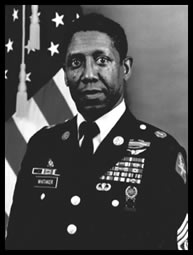Command Sergeant Major
Ivory Whitaker, Jr.
 CSM Ivory
Whitaker, Jr. was born on January 10, 1948 in Albany, Georgia. He joined the Army on June 9, 1965 and attended
Basic and Advanced Infantry Training at Fort Jackson, South Carolina.
CSM Ivory
Whitaker, Jr. was born on January 10, 1948 in Albany, Georgia. He joined the Army on June 9, 1965 and attended
Basic and Advanced Infantry Training at Fort Jackson, South Carolina.
After three years as an infantryman with a combat tour in Vietnam with a Purple Heart Medal and an award for valor, he chose to pursue a career in Aviation Maintenance as a 35K, Avionics Mechanic and 35P, Avionics Equipment Maintenance Supervisor. From 1968 to 1975 he served in various positions in avionics repair at Fort Gordon and Hunter Army Airfield, Georgia.
In 1975, he was one of 12 African-American Soldiers selected to attend training in the nuclear weapons field as a 35F, Nuclear Weapons Electronics Specialist. He attained the rank of Sergeant First Class while serving as the Nuclear Electronics Advisor in the 84th Ordnance Battalion in Germany.
Upon arrival at Fort Meade, Maryland in 1978, he transferred to become a 55G, Nuclear Weapons Specialist and served as a Nuclear Weapons Maintenance Sergeant for HQ Company, US Army Garrison, Fort Meade.
Following a one-year assignment in Korea as a 55G for the 19th Support Command in 1979, he returned to Hunter Army Airfield in Georgia where he worked with engineer and artillery units, focusing his time on 8-inch and 155mm artillery weapons systems. Next, CSM Whitaker traveled to Germany in 1982 for an assignment as the Chief Ammunition NCO for the 1st Armored Division Support Command, where he maintained the training ammunition during the Force 86 transition to Materiel Management Centers (MMC).
In 1986, CSM Whitaker began a string of senior leadership positions. He was selected to be the pioneer First Sergeant for the 529th Ordnance Company. Following this assignment, he was selected to be the Assistant Commandant at the US Army Ordnance Munitions and Electronics Maintenance School’s (OMEMS) Noncommissioned Officer Academy in 1990.
CSM Whittaker next reported as Command Sergeant Major of the 70th Ordnance Battalion with which he deployed to Operation Desert Shield and Desert Storm. The 70th consisted of six ordnance companies making it one of the largest wartime ammunition battalions in Army history. After the end of hostilities, he went on to serve as the Command Sergeant Major of the 6th Ordnance Battalion in Korea in 1992.
CSM Whitaker culminated his Army career with two important leadership assignments. In 1993, he became the Command Sergeant Major of the 832nd Ordnance Battalion at Redstone Arsenal, Alabama, directing the training of Ordnance Corps Soldiers at the very beginning of their Army careers. He was not in this position very long when he moved to become the Commandant of the US Army Ordnance Munitions and Electronics Maintenance School’s Noncommissioned Officer Academy from 1993 to 1995.
CSM Ivory Whitaker Jr. retired in 1995.